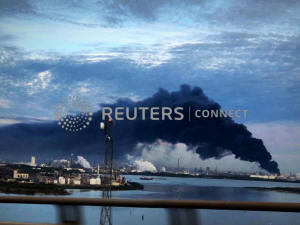|
Houston suburbs lift travel restrictions
imposed after petrochemical fire
 Send a link to a friend
Send a link to a friend
 [March 22, 2019]
By Gary McWilliams [March 22, 2019]
By Gary McWilliams
HOUSTON (Reuters) - Two Houston-area cities
told residents to stay indoors and closed schools on Thursday due to air
pollution from a petrochemical plant fire, then lifted the travel
restrictions after airborne levels of the chemicals abated.
The three-day blaze at Mitsui unit Intercontinental Terminals Co (ITC)
in Deer Park, Texas, was extinguished on Wednesday after sending a plume
of smoke over the area from 11 burning fuel tanks. No injuries were
reported, but air monitors detected high levels of benzene, a toxic
chemical linked to cancer.
The cities of Deer Park and Galena Park, both east of Houston, had
issued shelter-in-place advisories to residents after reports of high
levels of benzene or other volatile organic compounds (VOCs) were
detected. Both orders were lifted by 2 p.m., officials said.
Residents had been advised to remain indoors, turn off air conditioning
and heating systems, and close doors and windows, making sure to plug
any gaps, holes or cracks with wet towels or sheets.

A state highway was closed in Deer Park. School districts in the two
cities and four other nearby school systems canceled classes.
"I'm not worried," said Lillie Patton, a resident of Pasadena, Texas,
one of the communities that closed schools because of danger from
benzene fumes. "They've taken the necessary precautions. I appreciate
they are using their brains and common sense."
The benzene fumes likely originated from giant tanks of gasoline that
had been breached by the fire and exposed to the air. Workers on
Thursday were removing fuels from the damaged tanks, which each can hold
up to 80,000 barrels.
An ITC spokeswoman declined to say when the work would be completed.
Adam Adams, a U.S. Environmental Protection agency (EPA) official
monitoring the site, estimated the effort could be finished on Thursday.
The fire, which began on Sunday morning, destroyed 11 of the 242 giant
tanks at ITC's terminal, capable of holding up to 13.1 million barrels
of fuel. No one was injured during the fire, and a cause has yet to be
determined.
Benzene has a pungent odor, and inhaling it can irritate the skin, eyes
and the respiratory system, while severe exposure can harm the nervous
system or lead to unconsciousness, according to experts. The EPA
classifies benzene as a carcinogen.
[to top of second column]
|

Smoke rises from a fire burning at the Intercontinental Terminals
Company in Deer Park, east of Houston, Texas, U.S., March 18, 2019.
Jaimie Meldrum/@jamiejow/Handout via REUTERS

The state's environmental regulator said monitors detected up to
190.68 parts per billion of benzene in Deer Park early Thursday, a
level that can cause headaches and nausea. Deer Park sits on the
Houston Ship Channel, an area with nine oil refineries and dozens of
energy related facilities.
Total Petrochemicals and Refining USA, a unit of France's Total SA,
emptied several of its petrochemical tanks as a precaution, it
reported to the Texas Commission on Environmental Quality (TCEQ).
The flaring released thousands of pounds of propene, a volatile
organic compound, it said.
Royal Dutch Shell on Wednesday had ordered employees to avoid an
area at its facility where it had detected elevated levels of
benzene.
"Given our very conservative air quality standards we are at a level
where out of an abundance of caution there should be a shelter in
place," Lina Hidalgo, the chief executive of Harris County which
encompasses Houston and its suburbs, said during a morning news
conference.
"This is a dynamic situation," Hidalgo said.
Harris County Fire Marshal Laurie Christensen said firefighters have
continued to apply a foam blanket on the burn area to stop the
escape of dangerous fumes.
TCEQ, one of the groups investigating the incident, estimated that
on the first day of the fire, 6.2 million pounds of carbon monoxide
and thousands of pounds of nitrogen oxides, sulfur dioxide and
toluene were released. The regulator has cited ITC for violations of
state air-emissions rules 39 times over the past 16 years.

The EPA is to test local waterways for possible contamination from
the millions of gallons of water and foam dropped on the fire since
Sunday.
(Reporting by Gary McWilliams, Erwin Seba and Jennifer Hiller in
Houston; additional reporting by Brendan O'Brien in Milwaukee;
Editing by Bernadette Baum and David Gregorio)
[© 2019 Thomson Reuters. All rights
reserved.]
Copyright 2019 Reuters. All rights reserved. This material may not be published,
broadcast, rewritten or redistributed.
Thompson Reuters is solely responsible for this content. |